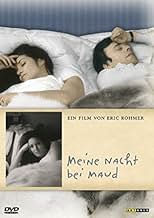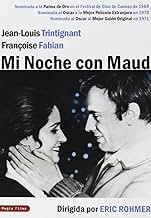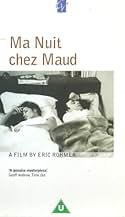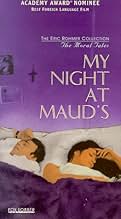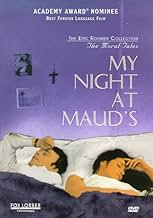Los rígidos principios de un hombre católico son puestos a prueba una noche por Maud, una mujer divorciada con una gran personalidad.Los rígidos principios de un hombre católico son puestos a prueba una noche por Maud, una mujer divorciada con una gran personalidad.Los rígidos principios de un hombre católico son puestos a prueba una noche por Maud, una mujer divorciada con una gran personalidad.
- Dirección
- Guionista
- Elenco
- Nominado a 2 premios Óscar
- 6 premios ganados y 6 nominaciones en total
- Dirección
- Guionista
- Todo el elenco y el equipo
- Producción, taquilla y más en IMDbPro
Opiniones destacadas
Eric Rohmer's film is full of dialogue. The characters talk and talk, often so intellectually that I had trouble keeping up. But the talk is interesting and intriguing. The main theme (it appeared to me, anyway) is the value of faith in a world where the likelihood of heaven is becoming increasingly unlikely. Jean-Louis, a former ladies man, fights his urges when Maud invites him into her bed. He eventually climbs in, feeling the cold, and begins to kiss her. He eventually pulls away, looking almost angry with himself. He obviously feels that an eternity in heaven, however unlikely the idea is, is worth more than a moment of weakness and happiness.
The dialogue-heavy scenes may not appeal to everyone, it can at times be difficult to engage with the film and bourgeois characters. But it is richly rewarding and a highly intelligent character study. The film has an almost love/hate attitude to the idea of Christianity in a similar way to many of Bergman's greatest films. One of the most intellectually stimulating films of the French New Wave movement.
www.the-wrath-of-blog.blogspot.com
Because it is a dialogue-driven piece, much more happens in the 54-minute-long "Suzanne's Career", Rohmer's second moral tale, than in "My Night at Maud's", which is about an hour longer. It can seem meandering at times, especially the first-half of the film, but put your trust in Rohmer. We're being bored to death for a reason. Listening to two Frenchmen discuss Pascal's Wager isn't very entertaining, but the payoff comes when, later on in the film, the characters are put into situations in which they have to make their own Pascal's wager, metaphorically speaking. The reward comes when we see these philosophies which they discussed tested in real-life situations, and we see how true, or untrue, to their ideals these characters are.
During the first fifty minutes, you may be bored out of your skull, but the way the film unfolds, you'll probably want to go back and watch the first fifty minutes again after it's over.
Two men, Jean-Louis and Vidal meet again after 15 years. They decide to go to visit Vidal's friend, Maud. In Maud's apartment the group of three have interesting discussions about Pascal, philosophy, moral and religion. What makes these discussions so interesting is the difference of Vidal, Jean-Louis and Maud. Jean-Louis is a catholic who believes in the holiness of man. Vidal is a Marxist who replaces God with history, he believes in history instead of God. Maud is an atheist, who believes in true short-term happiness. When Vidal leaves the apartment, Jean-Louis gets to a moral dilemma.
Jean-Louis talks a lot about a young blond woman he saw in church, Francoise. He doesn't know anything about her, but she represents religious and an ideal woman to him. Where Maud is the opposite to him. Jean-Louis doesn't believe in short-term happiness. So as he spends the night at Maud's he gets to a moral dilemma. According to his religious beliefs he should resist the temptation of Maud. Again his lie to Francoise is Christian compassion, but it's also a desire to hide his dishonesty.
My Night at Maud's goes very deep. It's not just about what's on surface: the intellectual dialogs and the moral dilemmas. The intelligence of Rohmer goes much deeper. And that is what I like in his films, even if you don't understand everything, the films have something that make you watch them again and again. I'm 17 and when I walked into a dark theater to see this fine film, I was blown away. When the film is over, you have came from a moral journey. So Eric Rohmer's film, obviously doesn't just stop at being the battlefield of ideologies.
These are among the reasons, I think, for the freshness of the movie. Because the way people talk, cherish their own opinions and express emotions is something which still happens today in human relationships! The film contains exactly situations of the ordinary life -you don't see that movie and think "It's only a film!".
Good performance -as always- of Jean-Louis Trintignant and superb black and white cinematography by Nestor Almendros.
¿Sabías que…?
- TriviaJean-Louis Trintignant's character is never called by name in the entire film. He is shown in credits as "Jean-Louis."
- ErroresWhen Jean-Louis Trintignant accepts to climb into bed with Françoise Fabian, he motions for her to pass him the blanket, extending his right hand holding a lit cigarette. The next shot from the side shows him grasping the blanket with a cigarette-free right hand.
- Citas
Jean-Louis: Are you still a Marxist?
Vidal: Absolutely. For a Communist, Pascal's wager is very relevant today. Personally, I very much doubt that history has any meaning. Yet I wager that it has, so I'm in a Pascalian situation. Hypothesis A: Society and politics are meaningless. Hypothesis B: History has meaning. I'm not at all sure B is more likely to be true than A. More likely the reverse. Let's even suppose B has a 10% chance of being true and A has 80%. Nevertheless I have no choice but to opt for B, because only the hypothesis that history has meaning allows me to go on living. Suppose I bet on A, and B was true, despite the lesser odds. I'd have thrown away my life. So I must choose B to justify my life and actions. There's an 80% chance I'm wrong but that doesn't matter.
Jean-Louis: Mathematical hope. Potential gain divided by probability. With your hypothesis B, though the probability is slight, the possible gain is infinite. In your case, a meaning to life. In Pascal's, eternal salvation.
Vidal: It was Gorky, Lenin or maybe Mayakovsky who said about the Russian revolution that the situation forced them to choose the one chance in a thousand. Because hope became infinitely greater if you took that chance than if you didn't take it.
- ConexionesFeatured in The 82nd Annual Academy Awards (2010)
Selecciones populares
- How long is My Night at Maud's?Con tecnología de Alexa
Detalles
Taquilla
- Total a nivel mundial
- USD 11,088
- Tiempo de ejecución1 hora 50 minutos
- Color
- Mezcla de sonido
- Relación de aspecto
- 1.33 : 1
Contribuir a esta página



